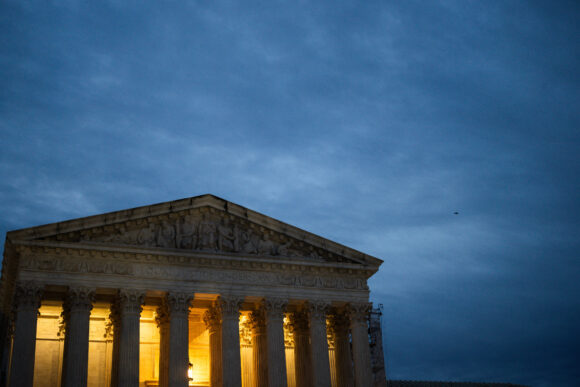As a US Supreme Court showdown over President Donald Trump’s global tariffs begins, yet another lawsuit contesting his trade policies hit the docket.
The timing was unusual, since it’s unlikely a judge would do anything until after the high court rules.
But a lawyer in the case said there’s a reason he brought it now, and pitched it as a class action: If the administration loses before the justices, it could give a boost to a wider swath of companies angling to recoup higher levies that Trump imposed under the International Emergency Economic Powers Act.
“We want to make sure all of the IEEPA tariffs are dead everywhere for everybody,” said John Vecchione, a lawyer with the New Civil Liberties Alliance, which sued on behalf of a board game company, a champagne importer and a mannequin manufacturer.
The complaint seeks to certify a class of companies that imported products from China or the European Union, with high stakes for potential refunds. The administration estimates the government will collect close to $500 billion in tariff revenue in the current fiscal year.
Since the Supreme Court earlier this year limited the authority of judges to impose what are known as “universal” injunctions that apply beyond the parties that sued, class action cases have been seen as a way to accomplish the same goal. More than $100 million could be at stake.
Vecchione’s tariff suit is at least the second brought in the past week before the Supreme Court hears arguments Wednesday in three cases filed months ago.
Another was filed on Oct. 30 in the US Court of International Trade on behalf of a group of businesses, though it’s not a class action. David Craven, a lead attorney in that case, said his clients decided to sue as a precautionary step.
If the Supreme Court strikes down the tariffs but leaves it to lower courts to hash out the remedy, Craven said the lawsuit would give his clients a way to try to “move to the front of the line” for a refund.
“The Trump administration has made it very clear that they don’t want to return this money, so we’re just making sure we have every possible T crossed and I dotted,” he said.
More than a dozen lawsuits have been filed in US courts contesting Trump’s executive orders imposing tariffs under the emergency powers law. Most are largely on hold while lower court judges wait for the final word from the justices.
White House spokesperson Kush Desai said in a statement that “President Trump lawfully exercised the emergency tariff powers granted to the executive branch by Congress, and the administration is confident in ultimate victory on this matter by the Supreme Court.”
If the Supreme Court declares the tariffs unlawful, businesses that have paid the higher levies would be poised to seek refunds.
Bloomberg News previously reported that the government could owe much of the $195 billion in duties collected in the fiscal year ended Sept. 30 — a process that could be chaotic, bureaucratically complicated and time-consuming.
The cases before the justices are focused on the core legal questions about Trump’s authority to impose the tariffs under the emergency powers law. Neither side has devoted much time to discussing what the practical outcome should be if his executive orders are struck down.
The US trade court originally entered a universal injunction that applied beyond the businesses and states that sued. A federal appeals court largely upheld that ruling but directed the lower court to reconsider the scope in light of new Supreme Court precedent limiting when judges can order “universal” or “nationwide” relief.
That next round of analysis hasn’t happened yet while cases are pending before the Supreme Court.
Vecchione said there is disagreement among legal experts about what would happen if the justices rule against the administration. Absent certainty that the older cases would guarantee that all companies and individuals affected by the tariffs are eligible to pursue refunds, he said his organization thought it was prudent to get a class action on the books seeking broad relief.
The New Civil Liberties Alliance, a libertarian-leaning public interest advocacy group, filed two earlier lawsuits challenging Trump’s tariffs on behalf of other companies and trade groups; neither sought to certify a larger class of plaintiffs. Their latest case was filed in the federal district court in Washington.
“Just in case the administration is going to fight this block by block, we want to have every bullet in the gun to shoot these down,” Vecchione said.
The case is Smirk & Dagger Games v. Trump, 25-cv-3857, US District Court, District of Columbia (Washington).
Photo: The US Supreme Court in Washington, DC. Photographer: Tierney L. Cross/Bloomberg
Was this article valuable?
Here are more articles you may enjoy.



 Fla. Commissioner Offers Major Changes to Citizens’ Commercial Clearinghouse Plan
Fla. Commissioner Offers Major Changes to Citizens’ Commercial Clearinghouse Plan  AI Claim Assistant Now Taking Auto Damage Claims Calls at Travelers
AI Claim Assistant Now Taking Auto Damage Claims Calls at Travelers  Lemonade Books Q4 Net Loss of $21.7M as Customer Count Grows
Lemonade Books Q4 Net Loss of $21.7M as Customer Count Grows  How One Fla. Insurance Agent Allegedly Used Another’s License to Swipe Commissions
How One Fla. Insurance Agent Allegedly Used Another’s License to Swipe Commissions 

